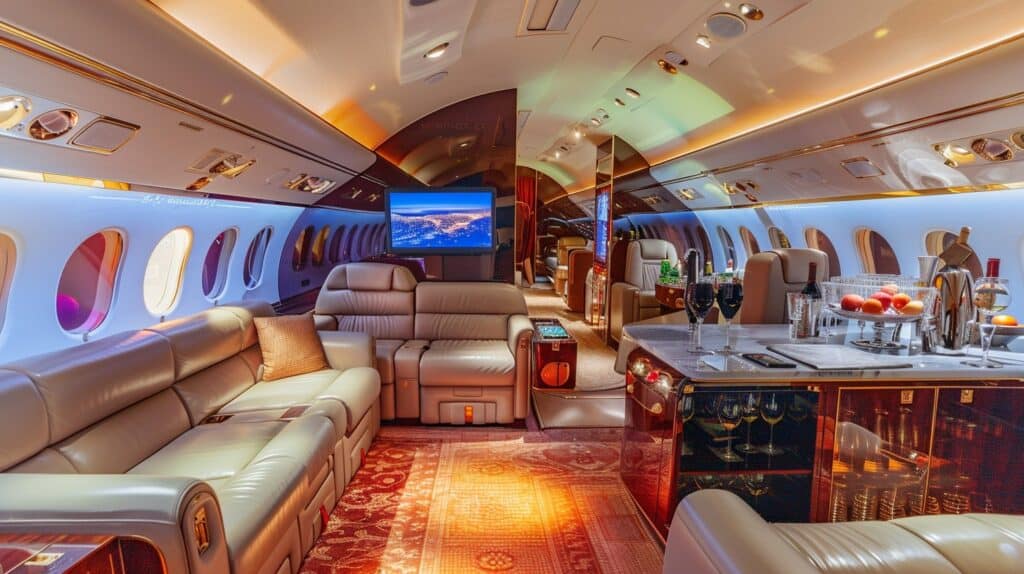Tired of long lines and cramped seats on regular flights? Here’s a fact: private jet charter offers a world where you can skip the hassle. This article gives you seven amazing ways to make your private flight even more special.
Get ready for takeoff!
Key Takeaways
Hold business meetings on a private jet for privacy and flexibility in your schedule. Enjoy meals tailored to your taste while discussing important deals with comfort.
Turn your flight into a fine dining experience. Choose from gourmet dishes prepared by chefs, making every meal unique and delicious high above the clouds.
Relax with music and games during your flight. There’s plenty of space to enjoy board or video games, turning the cabin into your personal entertainment lounge.
Bring pets along in the cabin for stress-free travel. They can enjoy the journey right by your side, ensuring they’re as comfortable as you are.
Change plans at the last minute without any hassle. Private jets offer unmatched flexibility, allowing you to alter destinations or schedules easily.
Table of Contents
Organizing Business Meetings Onboard

Moving on from the introduction, let’s talk business. Holding meetings onboard a private jet isn’t just fancy; it’s smart. You’re flying high, away from prying eyes and ears. This privacy means you can discuss top-secret deals or make big decisions without worry.
Plus, with pets lounging by your side and kids playing quietly, you’ve got a setting that feels more like your living room than an office.
In this premium airspace territory, comfort meets convenience. Need to start at dawn or delay until dusk? No problem. The schedule bends to yours here in the sky. And remember those personal dining options? They ensure that while brains are busy buzzing over business matters, stomachs are happily settled with whatever culinary delights you choose—making sure every attendee is perfectly primed for productivity and pleasure alike.
Fine Dining Experience in a Private Jet

After wrapping up your business meetings onboard, it’s time to switch gears. Imagine kicking back and enjoying a five-star meal high above the clouds. On private jets, chefs can whip up whatever you’re craving.
You want a steak mid-flight? They’ve got you covered. How about sushi that tastes like it’s straight from Tokyo? No problem. This isn’t your typical airline food; it’s an upscale dining adventure right at your seat.
“Eating well is not just a form of self-respect—it’s also about 35,000 feet in the air.”
Private jet travel changes the game by letting passengers call the shots on their dining experience. Forget pre-packaged meals; here, freshness and customization take center stage.
You decide what and when you eat, making every bite tailor-made for your taste buds. Plus, with FBOs allowing seamless access to private aircraft steps, there’s no fuss getting on board to start this unique culinary journey.
Relaxation and Leisure Activities

Kick back and let the stress fly away. On a private jet, you can chill out in ways you never thought possible. Take your relaxation seriously; listen to your favorite tunes without headphones, or challenge someone to a game.
It’s your sky-high lounge! And for those wondering where do private jets land – pretty much anywhere they’re allowed, making your trip as smooth as silk. Keep reading to discover even more ways to make your flight unforgettable.
Listening to Music Out Loud
Turn up the volume and enjoy your favorite tunes without headphones. On a private jet, no one gives you side-eye for blasting music. It’s your own space, after all. You can laugh with friends over old hits or get lost in new albums by yourself.
The aircraft cabin becomes your personal concert hall.
Next up, explore the fun of playing games from cards to trivia battles onboard.
Playing Various Games
Board games aren’t just for rainy days at home. On a private jet, you can spread out the board and dive into a game of chess or Monopoly. It’s a great way to kill time and add some fun competition to your flight.
You don’t have to worry about elbow room or losing pieces between seats like on commercial flights.
Video games take the entertainment up a notch. Many private jets come equipped with consoles, letting passengers challenge each other in racing or sports games. This isn’t your typical airline experience; it’s first-class digital gaming in the sky.
Imagine cruising above the clouds while scoring goals in soccer or speeding down virtual tracks – boredom doesn’t stand a chance.
Unconventional Perks of Private Jet Travel

Flying a private jet isn’t just about getting from point A to point B; it’s a whole other level of travel. Beyond the plush seats and gourmet meals, there are some pretty cool extras you might not know about.
For starters, imagine your furry friend hopping on next to you, with no hassle or extra paperwork. Yep, pets can chill in the cabin just like anyone else. Craving sushi or maybe a pizza? You can have whatever food you’re in the mood for, made just how you like it.
And if plans change? No sweat. You can switch up your flight times or even destinations without breaking a sweat.
So why settle for regular flying when you could be soaring through the skies with all these amazing perks at your fingertips? Make sure to check out more on this high-flying lifestyle – it’s an experience that truly lets you travel like royalty!
Taking pets in the cabin
Bringing pets on a private jet makes the trip better for both owners and their furry friends. Unlike commercial airlines, where pets often travel in cramped conditions, a private jet offers them freedom to roam the cabin.
This means no more stress about how they’re handling the cargo hold’s darkness or noise. Pets can settle by your side, making the journey as pleasant for them as it is for you.
Your pet deserves first-class travel, too.
On a private jet, meal times can also cater to your pet’s needs. Forget airline meals that hardly appeal to human passengers; here, you can request favorite treats and dishes that make your pet feel at home above the clouds.
The crew understands that looking after all passengers, including those with paws and tails, is part of delivering an unmatched travel experience.
Customizing meal options
You can pick your meals and tell the chefs when you’re hungry on a private jet. This means you can enjoy exactly what you crave, right when you want it. From a juicy steak to sushi, your options are endless.
You say the word, and the culinary crew gets to work, making dining in the skies feel like a five-star restaurant.
Next up is deciding how to spend those moments after enjoying a great meal.
Changing plans last minute
Ever been stuck with a rigid flight schedule? Private jet travel laughs in the face of such problems. Flexibility is king here. Feel like switching your destination mid-flight? No problem.
These jets can pivot on a dime, making last-minute changes a breeze. This means you could be sipping coffee at home and decide you’d rather breakfast in Paris. Just give the word, and it’s wheels up in no time.
This isn’t just about whimsical location swaps, either. Say goodbye to overnight waits for the next flight out or racing through terminals to make that early meeting. Private aviation hands you the control; take off fits your schedule, not the other way around.
And if Fido’s coming along for the ride, he gets a front-row seat too—no cargo hold nightmares here! So pack light or bring it all; luggage limits are but a mere suggestion in this realm of air travel, where convenience meets luxury at every turn.
FAQs About What to Do on a Private Jet
Can I really travel like a one-percenter on a private jet?
Absolutely! When you step onto that plush private jet interior, you’re not just flying; you’re cruising through the clouds in first-class style. Forget about those long lines at commercial airports and say hello to quick check-ins and feeling like royalty.
What makes flying on a business jet so special compared to commercial aircraft?
Oh, where do we start? Imagine skipping those pesky security checkpoints, waving goodbye to cramped seats next to strangers, and enjoying cabins that feel more like cozy living rooms than airplane spaces. Plus, your pilots might just share some cool stories from the flight deck!
How does baggage allowance work on a light jet?
Think of it as your closet traveling with you. You won’t have to worry about cramming all your bags into tiny spaces or paying extra fees for going over the limit – most times, what you pack is what gets onboard, hassle-free.
Are there any eco-friendly options for flying private?
Yes, indeed! Many companies now offer carbon offset programs to make your high-flying adventures greener. It’s like giving Mother Nature a high-five while zooming above the clouds.
Do I get my own cabin attendant on every flight?
You bet! Your very own cabin attendant will be at your beck and call, ready to serve up gourmet meals or just keep you company with sparkling conversation – making sure every moment is as smooth as silk.
How can I make my trip even more amazing?
Ever thought about hosting a silent auction in the sky or signing up for fractional ownership to get those wings whenever you want them? The sky’s literally the limit when it comes to adding dashes of excitement to your journey aboard these luxurious jets.




